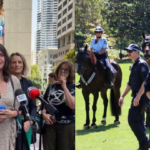The Offence of Unauthorised Use or Possession of a Firearm in NSW

A weekend away has been a costly one for twelve NRL Players who allegedly attended a camping trip in Taree during lockdown, with police handing out more than 19 penalties, and the NRL issuing hefty fines to some of the players.
Police fined Latrell Mitchell, Josh Addo-Carr and Tyronne Roberts-Davis $1,000 over the getaway, and the NRL has fined four players for ‘bringing the game into ‘disrepute’ by flouting social distancing laws amid the coronavirus pandemic, and as it desperately tried to convince the Government to start the season.
Mitchell and Addo-Carr were given $50,000 fines, with 60 per cent of the sum suspended, as well as banned for one match.
The pair have also been charged with firearm offences and are due to appear in Taree Local Court in August.
Police allege that Mitchell unlawfully gave possession of a firearm to Mr Addo-Carr, who was not authorised to have it. As a result, Mitchell is charged with giving a firearm to a person not authorised to use it. He has had his firearm licence suspended and police have seized several of his firearms.
Addo-Carr has been charged with the unauthorised use of a firearm.
Firearms offences in NSW
Australia has some of the toughest firearms legislation in the world for the unauthorised use or possession of firearms, and many of the applicable offences in our state are contained in the Firearms Act 1996 (NSW).
Unauthorised use or possession of a firearm
Unauthorised possession or use of a firearm is an offence under section 7A of the Act which carries a maximum penalty of 5 years in prison.
To establish the offence, the prosecution must prove beyond reasonable doubt that:
- You possessed or used a firearm, and
- You were not authorised to do so by a permit or licence.
Section 4 of the Act provides that you are in ‘possession’ if:
- You have custody of the firearm, or
- You have it in the custody of another person, or
- It is in or on any premises, place, vehicle, vessel or aircraft, whether or not belonging to or occupied by you
Section 4A makes clear that possession includes where the item is in or on any premises you own, lease or occupy, or in your care, control or management, unless you satisfy the court that:
- It was placed in or on, or brought into or onto, the premises by or on behalf of a person who was authorised to do so, or
- You did not know and could not reasonably be expected to have known that it was in or on the premises, or
- The evidence otherwise establishes that you were not in possession of the
‘Premises’ means any place, vehicle, vessel or aircraft.
Section 4 defines a ‘firearm’ as:
A gun, or other weapon, that is or was capable of propelling a projectile by means of an explosive, and includes a blank fire firearm, or an air gun, but does not include a paintball marker.
Section 4D makes clear that it includes an ‘imitation firearm’ which is an object that, regardless of its colour, weight or composition, or the presence or absence of any moveable parts, substantially duplicates in appearance a firearm, but is not a firearm.
This does not include an object produced and identified as a children’s toy.
Defences to the charge include:
- Duress,
- Necessity, and
- Self-defence.
In the event that evidence of a legal defence is raised, the onus shifts to the prosecution who must prove beyond reasonable doubt that the defence does not apply.
Unauthorised use or possession of a pistol or prohibited firearm
Unauthorised use or possession of a pistol or prohibited firearm is an offence under section 7 of the Act which carries a maximum penalty of 14 years in prison.
To establish the offence, the prosecution must prove beyond reasonable doubt that:
- You possessed or used a pistol or prohibited firearm, and
- You were not authorised to do so by a permit or licence
A ‘pistol’ is defined as a firearm that:
- is reasonably capable of being raised and fired by one hand, and
- does not exceed the dimensions prescribed by the regulations
Schedule 1 of the Act contains a long list of ‘prohibit firearms’ which include:
- Machine guns, sub-machine guns and other automatic weapons capable of shooting bullets in rapid succession
- Self-loading shotguns, rim-fire and centre fire rifles
- Firearms capable of discharging liquid, powder, gas, chemicals, flares or dye
- Canons and powerheads, and
- Firearms disguised as other items, such as walking sticks
Again, duress, necessity and self-defence are legal defences to the charge.
Giving possession of firearms or firearm parts to unauthorised persons
Giving possession of firearms or firearm parts to unauthorised persons is an offence under section 50B of the Act which carries a maximum penalty of 5 years in prison, or 14 years where the firearm was a pistol or prohibited firearm.
To establish the offence, the prosecution must prove beyond reasonable doubt that:
- You gave possession of a firearm to another person, and
- The person you gave the firearm to was not authorised to possess it.
Again, duress, necessity and self-defence are defences to the charge.
Australia’s tough gun laws
Former Prime Minister John Howard is responsible for Federal gun legislation introduced as a result of the Port Arthur Massacre in April 1996, when gunman Martin Bryant killed 35 people. He later pleaded guilty and is serving 35 life sentences without the possibility of parole.
At the time, the gun lobby, and other factions of government were fiercely opposed to the laws which proposed a national approach to gun control, including banning military-style firearms and instituting a buyback of unregistered, illegal and unwanted firearms.
The legislation did pass, however, and over time the introduction of the laws, has become considered to be a significant contributing factor to Australia’s declining rates of both homicide, and suicide by gunshot over the past few decades. Certainly, many countries look to Australia’s legislation when considering their own, given that it doesn’t prohibit gun ownership, but it is tightly controlled.
The basic premise of the laws is that a person must have a genuine reason to have a firearm, such as being the owner of a rural property or being a current member of an approved hunting club.
Anyone who wants to own a firearm must obtain a firearm licence, and there are strict penalties for breaking the many rules and regulations that come with owning a firearm. Australia also has a national firearms registry which aims to track the items around the country.
When legislation was first introduced in 1966, the government also set out a national amnesty period during which prohibited and unregistered firearms could be surrendered; and it also created a buy-back scheme, created through a fund levy on income tax to purchase banned firearms from owners.
Continuous amnesty to hand in firearms
Following a three month amnesty in 2017, during which more than 57,000 firearms were handed into police, all states and territories across Australia agreed to make the nationwide amnesty a continuous program — meaning it has no end date — enabling owners to hand in their firearms without questions being asked of them.
Having a continuous gun amnesty, along with very strict laws, are both designed to ensure that unwanted, unregistered or illegal firearms, firearm parts, banned firearm accessories and ammunition are able to be disposed of properly, and taken out of the community, making it harder for guns to fall into the hands of criminals or innocent children.
The amnesty means people can hand over the items without fear of criminal charges being brought against them.
Going to court for a firearms offence?
If you have been accused of a firearms offence and are going to court, call Sydney Criminal Lawyers anytime on (02) 9261 8881 for strong representation by an experienced criminal defence team who will explain your options, the best way forward and fight for the optimal outcome in your case.
Receive all of our articles weekly
Related Articles
RELATED LEGISLATION
- Section 7 Firearms Act 1996 | Offence of Unauthorised Possession or Use of Pistols or Prohibited Firearms
- Section 7A Firearms Act 1996 | Offence of Unauthorised Possession or Use of Firearms Generally
- Section 50B Firearms Act 1996 | Giving Possession of Firearms or Firearm Parts to Unauthorised Persons








